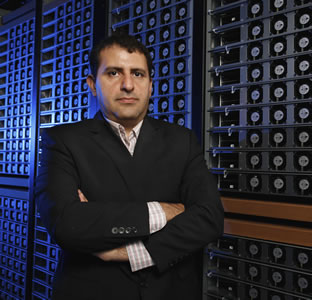UTSA partners on $10M NSF grant to create cloud-computing testbed

Paul Rad

Paul Rad
(Sept. 18, 2014) -- The University of Texas at San Antonio (UTSA) is one of five institutions nationwide partnering on a $10 million National Science Foundation (NSF) grant to create a cloud-computing testbed that will let researchers develop and experiment with new cloud architectures and applications.
The NSFCloud project, based at the University of Chicago and the Texas Advanced Computing Center at the University of Texas at Austin, will support the design, deployment and initial operation of Chameleon, a large-scale testbed consisting of 650 cloud nodes and five petabytes of storage. One petabyte is the equivalent of 1,000 terabytes. Petabytes are commonly used to measure the total data stored in large computer networks or server farms.
Paul Rad, co-principal investigator for Chameleon and UTSA director of applied research in cloud and big-data computing, will lead training and outreach efforts for the project. Other research partners include The Ohio State University and Northwestern University.
"Cloud is at the earliest stage of adoption," said Rad, "It's a phenomenon that is going to change the shape not only of industry but of our lives, and that is why the National Science Foundation thinks scientists and engineers need their own cloud."
Researchers in the UTSA Cloud and Big Data Laboratory will configure portions of Chameleon and create clouds using customized software. Scientific communities will use the testbed to analyze data on a variety of issues ranging from machine learning and adaptive operating systems to climate simulations and flood prediction. The testbed also will allow researchers to experiment with new virtualization technologies that could improve cloud reliability, security and performance.
The UTSA Cloud and Big Data Laboratory was established to support cloud computing and big-data research and development. The laboratory, developed in large part through industry collaboration, helps the international business community improve its computing platforms through open-source hardware and cloud and big-data technologies such as Open Compute, OpenStack and Software Defined Network.
------------------------------
Connect online with UTSA on Twitter, Facebook, YouTube and Instagram.
Events
This academically rigorous mathematics-based summer enrichment program prepares middle and high school students for advanced studies in science, technology, engineering and mathematics (STEM). Participants learn about problem-solving systems, develop greater awareness of STEM careers and strengthen their research skills.
UTSA Main CampusArchaeology 101 will introduce campers to archaeology and build on learned skills through experimental activities (like cave painting, weaving, and garbology).
Center for Archaeological Research, UTSA Main CampusThe camp exposes rising high school juniors, rising seniors and incoming college freshman to the many facets of the criminal justice system. Students will have opportunities to learn the functions of police in society and apply scientific theories to criminal investigations by examining a mock crime scene.
UTSA Main CampusThe Academy for Teacher Excellence Research Center invites you to join us for the Summer Bridging Institute. This institute will focus on being lifelong growers and continually seeking to increase our skills as educators.
UTSA Downtown CampusArchaeology 201 will briefly go over the foundations of archaeology and related skills, followed by a different topic over the course of this week (like skeletal analysis, global cultures, and more).
Center for Archaeological Research, UTSA Main CampusCraft a comic to create your own narrative and find your voice through storytelling. Participants will learn to create characters that are self-reflective and through a community lens.
REGSS Community Room (DB 3.202,) UTSA Downtown CampusCome enjoy a discussion on art as a self expression in the age of moving technology and telling your story with a community.
REGSS Community Room (DB 3.202,) UTSA Downtown Campus

